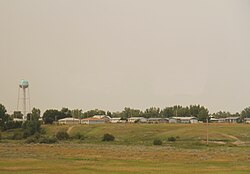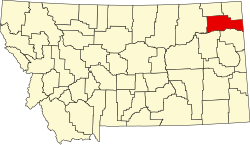2010 census
As of the census [10] of 2010, there were 810 people, 313 households, and 196 families residing in the city. The population density was 2,892.9 inhabitants per square mile (1,117.0/km2). There were 352 housing units at an average density of 1,257.1 per square mile (485.4/km2). The racial makeup of the city was 25.2% White, 71.4% Native American, 0.2% Asian, 0.1% from other races, and 3.1% from two or more races. Hispanic or Latino of any race were 0.6% of the population.
There were 313 households, of which 40.9% had children under the age of 18 living with them, 31.3% were married couples living together, 19.2% had a female householder with no husband present, 12.1% had a male householder with no wife present, and 37.4% were non-families. 32.3% of all households were made up of individuals, and 9.5% had someone living alone who was 65 years of age or older. The average household size was 2.53 and the average family size was 3.16.
The median age in the city was 31.2 years. 30.7% of residents were under the age of 18; 10.8% were between the ages of 18 and 24; 25% were from 25 to 44; 25% were from 45 to 64; and 8.4% were 65 years of age or older. The gender makeup of the city was 50.2% male and 49.8% female.
2000 census
As of the 2000 census, [11] there were 911 people, 325 households, and 206 families residing in the city. The population density was 3,406.0 inhabitants per square mile (1,315.1/km2). There were 350 housing units at an average density of 1,308.5 per square mile (505.2/km2). The racial makeup of the city was 63.67% Native American, 0.11% African American, 32.16% White, 0.77% Asian, 0.22% from other races, and 3.07% from two or more races. Hispanic or Latino of any race were 0.88% of the population.
There were 325 households, out of which 33.5% had children under the age of 18 living with them, 36.9% were married couples living together, 19.4% had a female householder with no husband present, and 36.6% were non-families. 32.3% of all households were made up of individuals, and 12.6% had someone living alone who was 65 years of age or older. The average household size was 2.57 and the average family size was 3.26.
In the city, the population was spread out, with 30.7% under the age of 18, 8.0% from 18 to 24, 29.6% from 25 to 44, 20.2% from 45 to 64, and 11.4% who were 65 years of age or older. The median age was 33 years. For every 100 females, there were 106.1 males. For every 100 females age 18 and over, there were 102.9 males.
The median income for a household in the city was $24,896, and the median income for a family was $29,688. Males had a median income of $22,250 versus $19,000 for females. The per capita income for the city was $10,579. About 23.4% of families and 31.5% of the population were below the poverty line, including 32.6% of those under age 18 and 22.2% of those age 65 or over.





